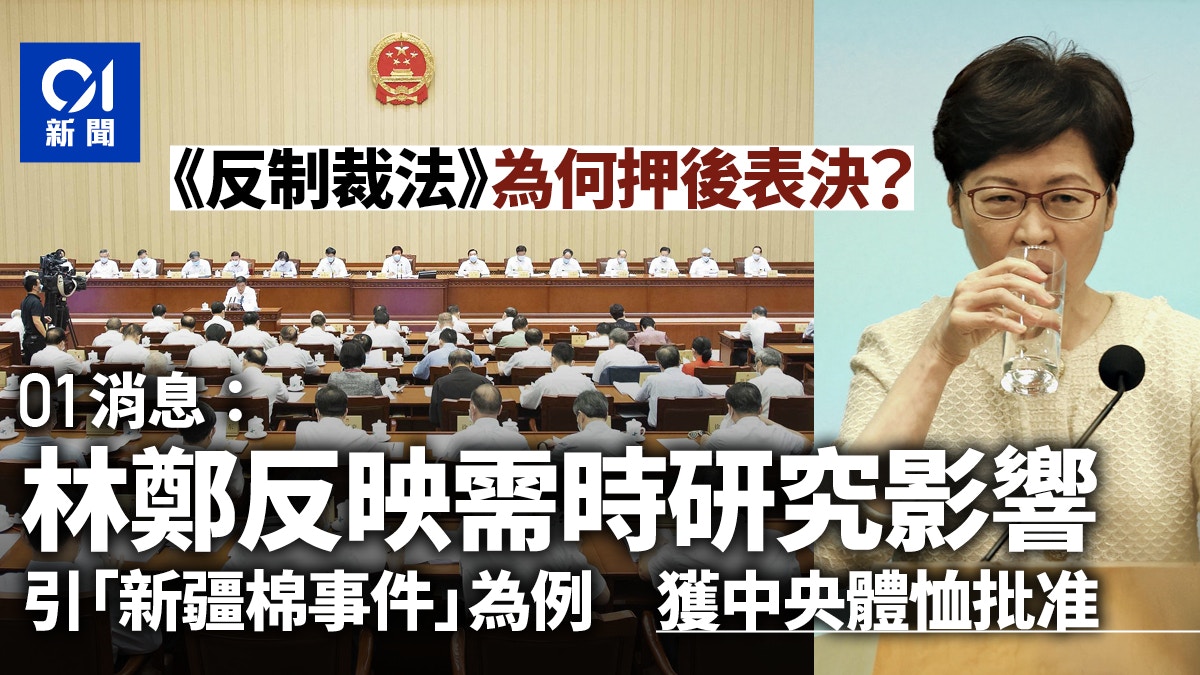The Standing Committee of the National People's Congress postponed its vote to include the Anti-Foreign Sanctions Law in Annex III of the Basic Law. The reasons behind it are divergent, including concerns about affecting the economy of Hong Kong and the Mainland.
But as far as I know, the real reason is more complicated.
According to a source close to Beijing, Chief Executive Carrie Lam reflected to the central leadership in the final stage that the actual impact of the Anti-Foreign Sanctions Law may be wider than expected, including the possibility of affecting the operation of Hong Kong’s judicial system. Therefore, I hope that there will be more time for it. The SAR government studies and masters, and formulates plans to respond.
The senior officials of the central government finally understood the reality of Hong Kong and accepted the relevant suggestions.
The Xinjiang cotton incident was sanctioned by a British law firm with a Hong Kong judge
It is reported that Lam Cheng’s statement to the high level of the central government included the "Xinjiang Cotton Incident" as an example. At that time, the Mainland sanctioned the British Essex Court Chambers and the Hong Kong Court of Final Appeal Judge Hao Liansi. (Lord Lawrence Collins) was listed as an arbitrator in the subsidiary arbitration branch of Essex Court. After the Anti-Foreign Sanctions Law is implemented in Hong Kong, Hao Liansi may not continue to serve as a non-permanent judge of the Court of Final Appeal. This is reflected in the reality of Hong Kong. The impact of the Foreign Sanctions Law is not limited to the economy, there are other important aspects that have not been noticed.
According to the news, Lam Cheng asked the central government to give time to allow the SAR government to obtain relevant information, assess how many levels may be affected and the extent of the impact, and formulate a response plan as soon as possible to prevent the "Anti-Foreign Sanctions Law" from appearing when it is implemented in Hong Kong. Short board.
The non-permanent judge of the Court of Final Appeal Hao Liansi (Lord Lawrence Collins).
(Photo of British Parliament)
The Hong Kong government needs time to assess the impact and formulate a response plan
According to the news, the top officials of the central government are sympathetic to Hong Kong’s unique situation and finally accepted Lin Zheng’s suggestion. On the closing day of the Standing Committee of the National People’s Congress last Friday (20th), there was no proposal to include the Anti-Foreign Sanctions Law in Annex III of the Basic Law. The motion was passed by a vote, allowing the SAR government more time to study it.
Tan Yaozong, a member of the Standing Committee of the National People's Congress, said in an inquiry from "Hong Kong 01" last Friday that the Standing Committee meeting deliberated on the proposal to add Annex III laws, and the chairmen's meeting decided not to vote for the time being and continue to study related issues.
Tan also said that he believes this will make the anti-foreign sanctions law more effective.
Tan Yaozong, member of the Standing Committee of the National People's Congress.
(Profile picture / Photo by Liang Pengwei)
Tan Yaozong once said that the effect of delaying the law enforcement
The SAR government also issued a statement that day, emphasizing that the central government has always been concerned about the development of the Hong Kong SAR and the well-being of Hong Kong citizens. The National People’s Congress and its Standing Committee, as the highest authority of the country, make decisions on Hong Kong matters based on Hong Kong’s interests. The SAR government will fully support, implement and cooperate with relevant decisions.
Carrie Lam said on Tuesday (24th) that she supports the inclusion of the Anti-Foreign Sanctions Law in Annex III of the Basic Law. She described her as having only one position and no other choice. She also believed that the Standing Committee of the National People's Congress would listen to many opinions during the deliberations. It has been proposed to the central government to ensure the effective implementation of the Anti-Foreign Sanctions Law, while not having too much impact on Hong Kong’s status as a financial and commercial center.
The Standing Committee of the National People's Congress usually holds meetings in even-numbered months. If there are no special circumstances, the next meeting is expected to be held in October.
Anti-Sanctions Law | The National People's Congress does not vote for the time being. Lam Cheng said he understands that he will continue to support the implementation of local legislation in Hong Kong. The West is lobbying Beijing to assess the economic and trade impact

